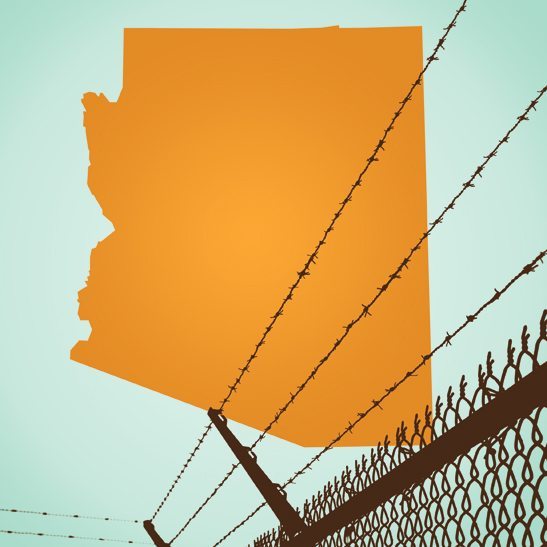Opponents of Arizona’s toughest-in-the-nation immigration law charge that it is unconstitutional and will lead to racial profiling, specifically targeting Hispanics. Supporters counter that the state statute corresponds with federal law and is designed to deal with those who break the law by entering the country illegally. Caught in the crossfire is Arizona’s fragile economy.
Regardless of where one falls on the SB 1070 debate, there is no doubt that it is having negative repercussions on the state’s economy. How severe those repercussions will be is unknown, and Valley and state business leaders are working hard to head off any further damage.
“It’s a negative and it’s not helping us,” said Barry Broome, president and CEO of the Greater Phoenix Economic Council.
The Phoenix City Council was told the city alone could lose up to $90 million in hotel and Phoenix Convention Center business over the next five years. At press time, city officials were monitoring at least 19 upcoming events, including some that already had pulled the plug on Phoenix, said Deputy City Manager Dave Kreitor.
Last month, Los Angeles became the largest city in the nation to prohibit its local government from doing business in Arizona unless the immigration law is repealed. There are estimates that the L.A. boycott could affect up to $8 million worth of contracts with Arizona. About two-dozen groups already have pulled events from Arizona, which tourism officials say has cost the tourism industry millions of dollars.
SB 1070
On April 23, Gov. Jan Brewer signed Senate Bill 1070 into law, making it a crime under state statute to be in the country illegally. Wording in the original law directed local police to question people they had made “lawful contact” with about their immigration status if there was reason to suspect they were illegal. Amendments to the law days after Brewer signed it included changing “lawful contact” to “lawful stop, detention or arrest”; and adding that officers cannot base their reasonable suspicion on race, color or national origin. The law goes into effect on July 29.
Although boycotts already have begun impacting the state’s tourism industry, Brewer said she has no intention of backing down. The state had to act, she said, because the federal government failed to secure the border with Mexico.
In a statement titled “Misguided Boycott,” Brewer said that when she signed the legislation, “I stated clearly I will not tolerate racial discrimination or racial profiling in Arizona.”
In response to a question about what Brewer can and will do to turn around the spread of boycotts and meeting cancellations, the Governor’s Office released this statement: “Governor Brewer will continue to aggressively oppose economic boycotts as a thoughtless effort that harms innocent families and businesses. Both proponents and adversaries of SB 1070 in Arizona have come out in staunch opposition to an economic boycott, including most recently Congresswoman (Ann) Kirkpatrick and the Tucson Hispanic Chamber of Commerce.”
Brewer went a step further in May when she announced the formation of a task force charged with rebranding the state as a tourist destination. Brewer said it was time to “get the truth out there” about the law.
Meanwhile, polls taken before and after the law’s passage show Arizonans’ support of the statute is fluctuating. A Rasmussen poll taken a week before the law was signed showed 70 percent of residents supported the measure. A survey taken a week after the law was signed showed support dropping to 52 percent. National polls have consistently shown strong support for the law.
“When you think of Arizona now, you think of this immigration law. That’s not the first thing you want people to think of.” – Barry Boome, Greater Phoenix Economic Council
Threat to tourism
Debbie Johnson, president and CEO of the Arizona Hotel & Lodging Association, released a statement saying the tourism industry is “deeply concerned about the repercussions that will result from the debate around Senate Bill 1070.”
The statement from Johnson, who also leads the Valley Hotel & Resort Association and the Arizona Tourism Alliance, continued: “Arizona tourism is currently in a very fragile state of recovery and the negative perceptions surrounding this legislation are tarnishing Arizona’s image and could easily have a devastating effect on visitation to our state.”
Any loss of business negatively impacts the tourism industry and “directly affects the paychecks and health benefits of our most vulnerable tourism employees as well as their families,” Johnson added. She also stated that the tourism industry provides 200,000 jobs and $1.4 billion in tax revenues to state, city and county budgets.
Kristen Jarnagin, communications director for the Arizona Hotel & Lodging Association, said that as of the first week of May, 23 groups had cancelled meetings in Arizona, resulting in a loss of up to $10 million.
One group that pulled out is the American Immigration Lawyers Association, which canceled a fall conference in Scottsdale. Another is the African-American Alpha Phi Alpha Fraternity Inc., which was supposed to hold its convention in Downtown Phoenix in July, bringing an estimated 5,000 attendees and as many as 10,000 visitors. Instead, it’s going to Las Vegas.
Corporate impact
Some Arizona companies also are feeling the sting generated by the controversy. Some opponents of the law are urging people not to fly Tempe-based US Airways or to rent trucks from Phoenix-based U-Haul.
Even the state’s professional sports teams have been affected. Pickets urging a boycott of Arizona took place outside of Wrigley Field in Chicago when the Arizona Diamondbacks were playing the Cubs there. In addition, Sen. Charles Schumer (D-NY), has called on Major League Baseball to pull the scheduled 2011 All-Star game out of Phoenix.
Derrick Hall, president and CEO of the Diamondbacks, said he was concerned, but noted that planning for the game has advanced to the point where “it would be difficult to back off … for 2011.” MLB Commissioner Bud Selig has been ignoring the boycott calls.
Phoenix Suns Managing Partner Robert Sarver stepped into the middle of the debate in May, by announcing that the team would wear its “Los Suns” jerseys in recognition of playing on Cinco de Mayo. Then he added that “frustration with the federal government’s failure to deal with the issue of illegal immigration resulted in passage of a flawed state law.”
But has the federal government’s failure to secure the border with Mexico cost Arizona business? Some of the state’s top economic development experts say no. Shortly after the law was signed, Broome of GPEC said he had never heard of any businesses that were considering relocating to Arizona expressing concerns about the state’s porous border with Mexico.
“In our discussions with companies looking to move to Arizona, we want to begin and end with good things — the emergence of (Arizona State University), quality of life and a talented work force,” Broome said. “The biggest hardship is on the brand. When you think of Arizona now, you think of this immigration law. That’s not the first thing you want people to think of.”
David Drennon, director of communications for the Arizona Department of Commerce, agreed with Broome that the flow of illegals across the border has been a non-factor in business relocation decisions.
“Actually, the proximity to Mexico is advantageous, giving businesses access to markets in Mexico and even South America,” Drennon said
As Arizona’s No. 1 trading partner, Mexico imported $4.5 billion worth of Arizona products such as semiconductor chips, machinery and plastics in 2009, according to the Arizona Department of Commerce.
What needs to happen next, Broome said, is for business and government leaders to clearly communicate the law’s intention.
“This law was signed without a clear understanding of how we are going to get involved in a communications strategy,” he said. “People need to understand that this is a law that mirrors federal law. That’s been lost.”
While the experts say the illegal flow of immigrants into Arizona has not chased away relocating companies, the storm over the new law is causing some out-of-state corporate anxiety.
Laura Shaw, senior vice president of marketing and communications at Tucson Regional Economic Opportunities (TREO), noted that officials with two major relocation prospects for the Tucson area say they are concerned about the uproar the immigration law has sparked.
“But they haven’t said no,” Shaw quickly added. The two prospects are in aerospace and bioscience, and would provide hundreds of jobs.
“Businesses looking to relocate or expand don’t like controversy,” she said.
Politicians, pundits and stars
It was precisely controversy that attracted high-profile celebrities to Arizona, including civil rights leader the Rev. Al Sharpton, actor Danny Glover and Colombian singer Shakira. And, in protest, comedian George Lopez canceled an appearance at an Indian casino just south of Phoenix.
As the Arizona bill was making its way through the capitol, the state’s two U.S. senators, John McCain and Jon Kyl, announced a 10-point border security plan. Among other things, it calls for deploying 3,000 National Guard troops along the Arizona-Mexico border and permanently adding 3,000 more Custom and Border Protection agents in the state.
McCain, who came out in support of the immigration law, said the current wave of protests and what happened after Arizona voters rejected a paid Martin Luther King Jr. holiday in 1990 are completely different.
“One was about honoring a civil rights hero who a majority of Americans held in extremely high esteem,” he said. “The other is about an issue of national security and the security of our citizens, where we have broken borders and are literally overwhelmed with both human smuggling and drugs.”
After the King vote, which was reversed in another election two years later, the NFL pulled the 1993 Super Bowl from Arizona. Estimates of lost convention business in the Phoenix area alone topped $190 million.
J.D. Hayworth, a former U.S. congressman and McCain’s opponent in this year’s hotly contested GOP primary, had urged Brewer to sign the law. In 2005, while still in Congress, Hayworth introduced the Enforcement First Act, which focused on border security. The bill did not pass. Hayworth’s press secretary, Mark Sanders, said the former congressman is continuing his efforts to seal the border.
“That’s where we start,” Sanders said. “And no amnesty. No reward for illegal behavior.”
U.S. Rep. Raul Grijalva, a Democrat who represents Southern Arizona’s 7th Congressional District, created an uproar of his own when he called for a boycott of a large chunk of the state’s tourism industry.
In a statement made a few days after the law was passed, Grijalva said, “This is a specifically targeted call for action, not a blanket rejection of the state economy … we are calling on businesses and organizations not to bring their conventions to Arizona until it recognizes civil rights and the meaning of due process. We don’t want to sustain this effort any longer than necessary. It’s about sending a message.”
Boycotting boycotts
James E. Garcia, director of communications for the Arizona Hispanic Chamber of Commerce, said his organization does not support the boycotts, but it is concerned about civil rights issues.
“We believe passage of this bill sends a message to the country and world that Arizona is somehow under siege by immigrants,” Garcia said. “That kind of message tells people: don’t start a business in Arizona and don’t be a tourist here.”
David Roderique of the Downtown Phoenix Partnership said the organization had arranged to have several individuals ask Brewer to veto the bill, fearing an economic backlash. After the law was signed, partnership representatives were involved in pitching Phoenix to the Democratic National Committee as the host city for the 2012 Democratic National Convention.
“The likelihood of the Democrats coming here now is zero,” Roderique said. “We have a definite concern that this will create a significant economic impact when we can least afford to have another major disruption.”
In May, the Republican National Committee bypassed Phoenix as the host of the 2012 Republican National Convention. AZGOP Chairman Randy Pullen immediately issued a statement saying that many would cite the new immigration law “as one of the reasons that Phoenix was not chosen (and) nothing could be further from the truth. Members of the RNC overwhelmingly support the immigration bill signed … and Republicans from coast-to-coast stand with Arizonans as we fight to secure our border.”
To that end, Roderique noted that if several other states pass similar laws, some of the spotlight might be shifted away from Arizona.
“If we’re not the lone wolf out there and other states are doing this, the feds are going to have to act,” he said. “It should not lie in individual states or individual municipalities to try to enforce immigration laws. We need a comprehensive federal reform package.”
At the Greater Phoenix Convention & Visitors Bureau, Doug MacKenzie, director of communications, said it was “misguided to bring the tourism industry into the crosshairs of this political issue.”
The CVB, which is trying to dissuade groups from considering boycotts, stated that “we may never know the full impact that all the publicity surrounding the passage” of SB 1070 will have on decisions by visitors and organizations choosing convention sites.
Michael Stawiarski, president of the Arizona Sunbelt Chapter of Meeting Professionals International, released a statement from the organization’s national president, Bruce MacMillan, blasting the boycotts: “Using travel boycotts as a political weapon in Arizona (or anywhere) only hurts the local communities and the 200,000 workers in the state that benefit from the meeting and event industry.”
gpec.org | azhla.com | aila.org | azcommerce.com | treoaz.org | azhcc.com | visitphoenix.com | tucsonchamber.org




